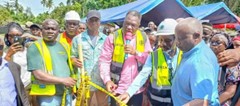Liberia has embarked on a transformative journey towards agricultural modernization and economic revitalization with the launch of its first Special Agro-Industrial Processing Zone (SAPZ). This ambitious project, situated in Harmonville Township, Grand Bassa County, is a collaborative effort between the Liberian government, the World Bank, and the African Development Bank. The initiative aims to revolutionize the nation’s agricultural sector, reduce reliance on food imports, bolster food security, and generate significant employment opportunities, particularly for youth. The groundbreaking ceremony, held in the port city of Buchanan, signaled the commencement of a project poised to reshape Liberia’s economic landscape.
The SAPZ project represents a substantial investment of US$19.4 million, primarily funded by the AfDB and the World Bank, with additional support from the Liberian government. This funding will be utilized to transform 200 hectares within the Buchanan Special Economic Zone into a state-of-the-art, climate-resilient agro-industrial hub. This hub will feature dedicated processing zones for key agricultural commodities such as cocoa, dairy, fruits, vegetables, and livestock. Crucially, the project also encompasses the development of essential supporting infrastructure, including a 5-kilometer access road and a 6.5-kilometer power line connected to the regional CLSG power grid originating from Ivory Coast. This infrastructure development is vital to the success of the SAPZ, ensuring efficient transportation and reliable power supply for the processing activities within the zone.
The SAPZ is projected to create approximately 56,000 sustainable jobs, with a specific focus on empowering youth and women, who will each represent 50% of the workforce. This emphasis on inclusivity underscores the project’s commitment to equitable economic development and social progress. By providing employment opportunities within the agricultural sector, the project aims to attract and retain a vibrant workforce, stimulating economic growth in the region. Furthermore, the project’s focus on local recruitment will foster a sense of ownership among community members and contribute to improved local security.
The Liberian government, led by President Joseph N. Boakai, views the SAPZ as a cornerstone of its broader economic recovery strategy, aligning with the President’s “ARREST” agenda, which prioritizes Agriculture, Roads, Rule of Law, Education, Sanitation, and Tourism. Vice President Jeremiah K. Koung, representing President Boakai at the groundbreaking ceremony, highlighted the project’s significance in realizing a long-held vision for agricultural development, a vision first articulated by former President William R. Tolbert, Jr. decades ago. He emphasized the urgency of the project and the government’s commitment to its successful implementation, urging all stakeholders to expedite the process and prioritize the needs of the local communities.
The establishment of the SAPZ marks Liberia’s entry into a growing network of West African nations, including Nigeria, Guinea, Senegal, and Togo, embracing agro-industrial development. Kaustella Kialain Sarsih, Senior Transport Engineer at the African Development Bank, reaffirmed the Bank’s commitment to supporting Liberia’s agricultural transformation, emphasizing the project’s potential to drive national prosperity. The collaboration between Liberia and the AfDB signifies a shared commitment to achieving sustainable economic growth through the modernization of the agricultural sector.
The SAPZ project is not just about building infrastructure and processing facilities; it represents a paradigm shift in Liberia’s approach to agriculture. It signifies a move away from subsistence farming towards value-added processing, creating new income streams and economic opportunities. The project aims to revitalize the agricultural sector, stimulate economic growth, and improve food security for the nation. As infrastructure development progresses, the SAPZ is expected to attract significant investment in the coming months, solidifying its position as a catalyst for economic transformation in Liberia. The initiative embodies a shared vision for a prosperous and food-secure future, driven by the power of agricultural innovation and sustainable development.


